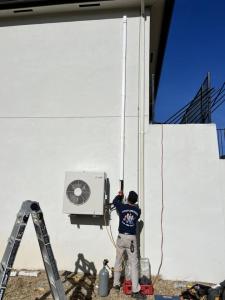Big Changes in the HVAC Industry that Impact Everyday Homeowners in 2025
SACRAMENTO, CA, UNITED STATES, October 15, 2024 /EINPresswire.com/ -- The HVAC (Heating, Ventilation, and Air Conditioning) industry is on the brink of significant transformation as we approach 2025. These changes are set to impact homeowners across the nation, bringing both challenges and opportunities. This press release aims to shed light on the upcoming shifts and what they mean for everyday homeowners.
Introduction of Eco-Friendly Refrigerants
One of the most notable changes in the HVAC industry is the transition to eco-friendly refrigerants. The American Innovation and Manufacturing (AIM) Act mandates a phasedown of hydrofluorocarbons (HFCs), which are potent greenhouse gases. Starting in 2025, the Environmental Protection Agency (EPA) will enforce a limit on the Global Warming Potential (GWP) of refrigerants used in new HVAC systems. This means that the widely used R-410A refrigerant, with a high GWP, will be replaced by alternatives such as R-454B and R-32, which are more environmentally friendly.
Impact on Homeowners
For homeowners, this transition means several things. Firstly, new HVAC systems will be more environmentally friendly, contributing to the global effort to reduce greenhouse gas emissions. However, this also means that older systems using R-410A will eventually need to be replaced or retrofitted to comply with new regulations. This could lead to increased costs for homeowners in the short term, but the long-term benefits include lower energy bills and a reduced carbon footprint.
Advancements in Smart HVAC Technology
The integration of smart technology into HVAC systems is another major trend. Smart HVAC systems use sensors and data analytics to optimize energy efficiency and provide better control over indoor climates. Homeowners can now monitor and adjust their HVAC systems remotely via smartphones or other devices, ensuring optimal performance and energy savings. Predictive maintenance, enabled by these smart systems, can also help identify potential issues before they become major problems, reducing downtime and repair costs.
Energy Efficiency and Renewable Integration
Energy efficiency remains a top priority in the HVAC industry. New systems are being designed to meet stricter energy standards, reducing overall energy consumption and costs for homeowners. Additionally, the integration of renewable energy sources, such as solar or wind power, with HVAC systems is becoming more common. This not only helps in reducing reliance on fossil fuels but also lowers greenhouse gas emissions.
Ductless HVAC Solutions
Ductless HVAC systems are gaining popularity, especially in older homes where installing traditional ductwork is challenging. These systems offer greater flexibility and efficiency, allowing homeowners to control the temperature in individual rooms or zones. This can lead to significant energy savings and improved comfort.
Conclusion
The HVAC industry is poised for significant changes in 2025, driven by environmental regulations, technological advancements, and a focus on energy efficiency. While these changes may present some challenges for homeowners, they also offer numerous benefits, including lower energy costs, improved indoor air quality, and a reduced environmental impact. Homeowners are encouraged to stay informed about these developments and consider upgrading their HVAC systems to take advantage of the latest innovations.
Dimitar Dechev
Super Brothers Plumbing Heating & Air
+ +1 9165888587
email us here
Visit us on social media:
Facebook
X
LinkedIn
Instagram
YouTube
Other

